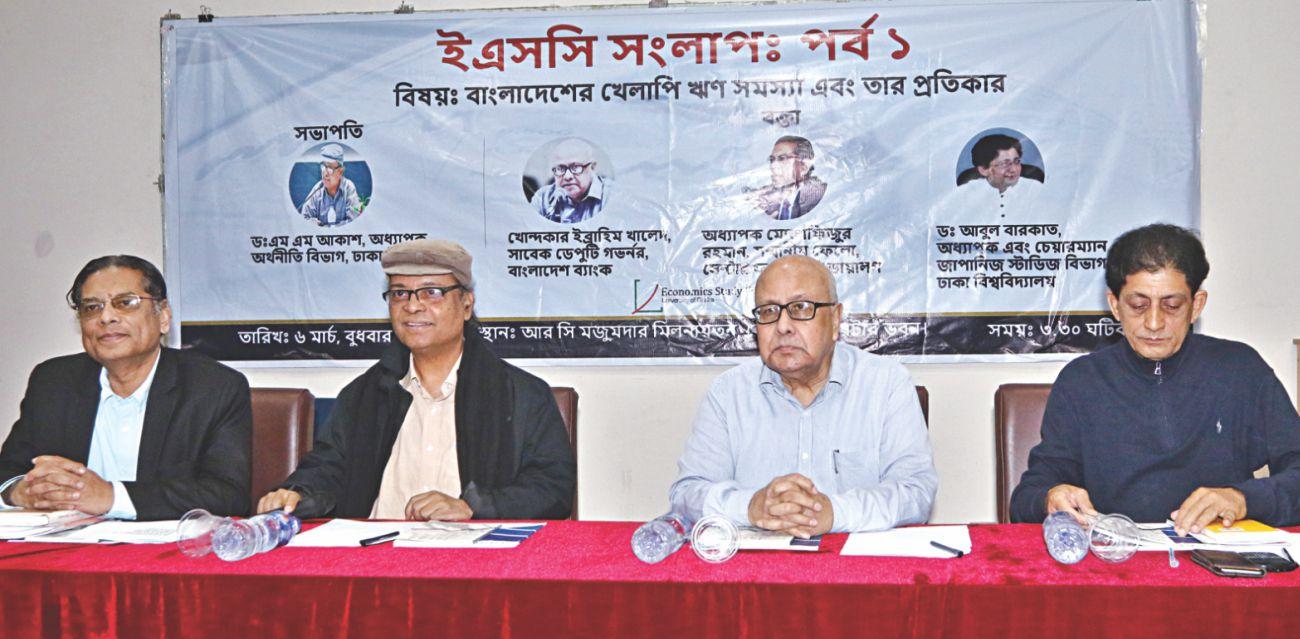Try habitual defaulters thru' special tribunal

Economists yesterday called upon the government to set up a special tribunal to bring habitual defaulters to book with a view to restoring corporate governance in the banking sector.
A major portion of default loans has been laundered abroad, casting a pall of gloom on the entire financial sector, they said at a dialogue titled “Loan default problem in Bangladesh and solution”.
Economics Study Centre, run by the students of the university's economics department, organised the dialogue at the RC Majumdar Auditorium of Dhaka University.
The country's future GDP growth will be badly affected if the rise of defaulted loans cannot be halted, said Mustafizur Rahman, a distinguished fellow of the Centre for Policy Dialogue.
Some defaulters have amassed huge amounts of assets by grabbing money from the banking sector, creating unfair discrimination in society, he said.
The current GDP growth will not sustain in the long run because of the concentration of assets in the hands of a few people, he said.
A defaulter now faces the highest of six months' imprisonment in line with Artha Rin Adalat Ain, 2003, also known as Money Loan Court Act, 2003, which is a silly sentence for such habitual defaulters, Rahman said.
Special tribunals should be formed to punish wilful defaulters by amending the existing acts, he said.
The non-performing loans in the banking sector stood at Tk 93,911 crore last year, up from Tk 74,303 crore a year ago.
Some unscrupulous persons looted money from banks in the pretext of taking loans, worsening the financial health of 14 private and five to six state-run banks, said Khondkar Ibrahim Khaled, a former deputy governor of Bangladesh Bank.
The government has been recapitalising the state lenders over the years by using taxpayers' money, which is highly unethical, he said.
The habitual defaulters and individuals involved with financial scams have managed support from the state agencies, posing a threat to the banking sector, Khaled said.
“A dual policy is now prevailing in the banking sector as the central bank is not allowed to dissolve boards of the state lenders. The policy has created a critical situation for the lenders,” he said. The government should give full autonomy to the central bank to supervise both the state and private lenders by revising Bank Companies Act 1991, he said.
Farmers have to face imprisonment because of their failure to pay small amounts of farm loans but there is no record of exemplary punishment being handed out to the habitual defaulters, said noted economist Abul Barkat, chairman of the Department of Japanese Studies.
Influential people are frequently lobbying for the defaulters, which has proved that the banking sector is now facing a lack of corporate governance, said Barkat, also a former chairman of Janata Bank.
MM Akash, a professor of the economics department, said the government should not amend the acts to give protection to the defaulters.
The state lenders should be free from the clutches of the finance ministry in order to improve their health, he said.
Shafiquzzaman, chairman of the economics department, delivered the welcome speech and Naziur Rahman, a master's student of the department, presented a thesis on the dialogue's topic.
